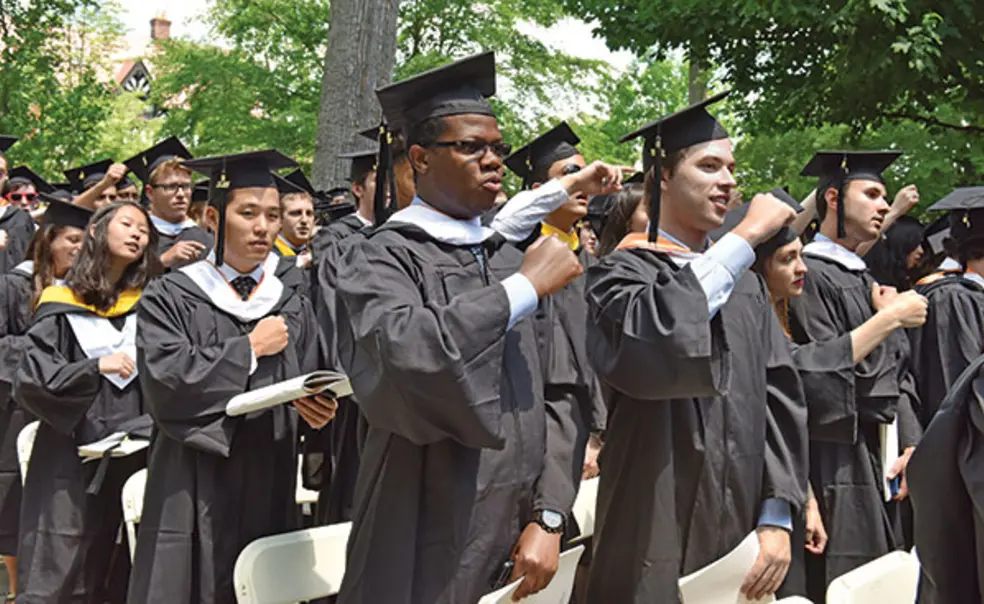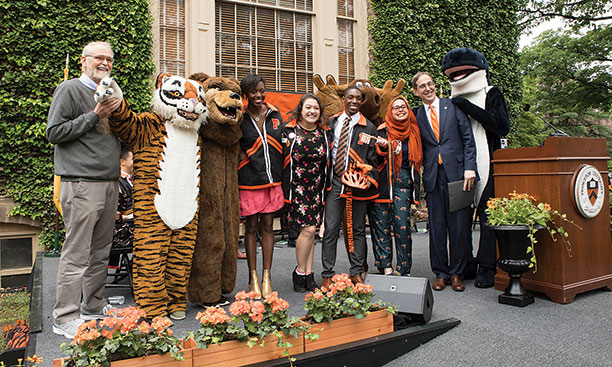During his Class Day address, Sen. Cory Booker of New Jersey tapped into a theme that carried over into Commencement, touching on the importance of gratitude, kindness, and small acts of goodwill.
“Your first language must always be kindness,” he said. “The definition of patriotism isn’t about how loud you sing the national anthem ... patriotism means love of country. And you cannot love your country unless you love your countrymen and -women.”
The senator, a Democrat, eschewed thorny, divisive political topics, instead telling the audience about a white lawyer who helped Booker’s parents move into a segregated neighborhood in New Jersey after watching the brutal assault on civil-rights protesters at the Edmund Pettus Bridge in Selma, Ala., in 1965.
Booker drew an inspirational message from the lawyer’s commitment to help African Americans gain access to equal housing: “One decision — in a world where we are so much more intricately interwoven than we know — one decision by one person on one day ripples out into community,” he said. “Never forget that the biggest thing you can do every day is often just a small act of kindness, decency, love, and caring.”
At Commencement on Tuesday, a picture-perfect day, valedictorian Kyle Berlin ’18 returned to the theme of kindness. “What if we gave up greatness for quiet compassion?” he asked. “What if we were No. 1 not in excellence ... but in compassionate listening or repeated forgiveness or radical love? And if we can’t figure it out together — if we can’t ask the right questions ... can’t practice kindness as a deliberate ethos and a knowledge — then who can?”
Berlin interrupted his address to ask audience members to speak to their neighbors for two minutes about what they thought people should know or feel “in this moment of farewell.” Turning to President Eisgruber ’83, Berlin assured him he had timed the break from his address before rushing off the stage and toward his class, eagerly engaging in conversation. He then returned to the podium to wrap up his talk and declare this “The Compassionate Class of 2018.”
Eisgruber urged the graduates to take part in the national debate over the value of higher education. “We need you to help others to achieve in the future what you achieve today,” he said. He offered three suggestions to help ensure more Americans attain college degrees, “a rocket booster for students seeking social mobility”: Advocate the importance of completing college, support public universities and colleges, and promote access to higher education for low-income students.
“Princeton’s Great Class of 2018 graduates today as the most socioeconomically diverse class in the 272-year history of this University,” Eisgruber said to enthusiastic applause, before adding: “You will not hold that distinction long. Other classes already at Princeton will break your record.”
At Baccalaureate on Sunday, Eduardo Bhatia ’86, minority leader and former president of the Senate of Puerto Rico, spoke passionately about the beleaguered island and how governmental apathy has hindered its restoration after Hurricane Maria. He beseeched graduates to rail against “alternative facts,” embrace equality, and carry Princeton values into the world.
“Silence is not an option,” Bhatia said. “Class of 2018, denounce what needs to be denounced; fix what is broken; right what is wrong, and do not allow anyone, regardless of their agenda, to use false data and pretenses to confuse citizens and weaken democracy.”
At Commencement — Princeton’s 271st — 1,281 degrees were awarded to members of ’18 (943 A.B. degrees and 338 B.S.E degrees), as well as three degrees to members of other classes who completed their requirements this year. Additionally, 563 graduate degrees were conferred, including 396 Ph.D. degrees.
Princeton also awarded five honorary degrees to individuals who have made distinguished contributions to architecture, education, the humanities, and public service.













3 Responses
Mikk Hinnov ’66
7 Years AgoThe Value of a College Degree
President Eisgruber’s 2018 Commencement Address fails to address or even mention the central source of doubt about the value of a college degree: selection bias. Undoubtedly college graduates earn more, on average, than non-graduates. But they are not otherwise a representative cross-section of their entire age cohort. They are the strivers and achievers of their cohort before they ever get to college. In fact, that is the basis on which they were selected for acceptance into college in the first place. It seems likely that they would out-earn those that were NOT selected, even if they never set foot thereafter in a college classroom at all. I’m not convinced that the substantive content of college courses (other than in the STEM fields) adds much value to or for the graduate. The real value of a college degree is that it suggests that the graduate has the stamina and ability to run and survive the gauntlet. College is just an additional selection mechanism.
Norman Ravitch *62
7 Years AgoFor a Fine College Education ...
Mr. Hinnov's comment on the non-value of a college degree is refreshingly cynical indeed! But he ignores one factor: Going to a college with a good reputation does not make you better educated, but it does give you contacts that could help you well into your future. This is why families and individuals will go into heavy debt to attend the schools with the best reputations if they can get in. As always, it is not what you know but whom you know and where you got to be known as a college student. That all this is true is not uplifting, but at least it is factual.
Even President Trump prefers Supreme Court justices from the Ivy League law schools, a sign that he values the degree he holds from the Wharton School at Penn despite the fact that he probably learned very little about economics and understands even less.
Since the best schools do not turn out the best graduates automatically, they know they need to polish up their brass often enough to keep the faith believed, even though it is doubtful. Were college-bound students and their families aware that all you need for a fine college education is a few good professors and a decent library, the top schools would see their applications plummet rather quickly, not to mention the effect of their usurious fees and tuitions.
Norman Ravitch *62
7 Years AgoPrinceton Never Was Polyanna
Princeton isn't a seminary for ladies, and Sen. Booker is not from some small town in Kansas but from Newark, NJ. I wonder what the graduates thought about such bland and prissy advice -- advice he himself had obviously abandoned enough to have survived his youth and his political environment.